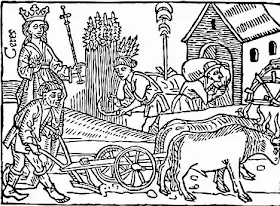 |
| The New Feudalism has many people feeling like peasants. |
"By the end of the 15th century, a skilled workman could provision his family with 10 weeks of work and a laborer with 15.
By the end of the 16th century (after the seizure of the monasteries and guild lands, which signalled the collapse of the system) wages collapsed and the corresponding numbers were 36 and 42 weeks."
- John Médaille
Feeling like a peasant lately? It is no wonder - the parallels between what is happening now and medieval feudalism are striking. Except today's top down structure leaves out the most important aspect - mutual obligations which provided protections during dangerous times.
Now we are expected to fulfill our obligations to those at the top of the feudal pyramid, while they have absolutely no obligations to us what-so-ever.
Medieval feudalism was much more than an economic system. More importantly, it was a set of social relations with responsibilities on all sides. Even the most arrogant baron felt some obligation to both the king and to his tenants.
Medieval vs. Corporate Feudalism
Those at the bottom, the peasants, knew what they needed to do in the chain of things, and in turn expected certain services from those at the top. A living wage, food, land, shelter, and protection from marauders was something even the lowest of the low could expect.
It is only when these obligations began to erode that you got the exploitive brand of corporate feudalism we know today.
Is this progress?

No comments:
Post a Comment
Comments will be published after moderation to eliminate spam. We are proudly a no buying, no selling website.
We enjoy reading all comments, and respond when time permits.
If you put a name to your comment we can all recognize you for your contribution.
Thank you for visiting and commenting.